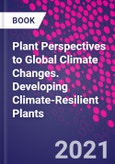Plant Perspectives to Global Climate Changes: Developing Climate-Resilient Plants reviews and integrates currently available information on the impact of the environment on functional and adaptive features of plants from the molecular, biochemical and physiological perspectives to the whole plant level. The book also provides a direction towards implementation of programs and practices that will enable sustainable production of crops resilient to climatic alterations. This book will be beneficial to academics and researchers working on stress physiology, stress proteins, genomics, proteomics, genetic engineering, and other fields of plant physiology.
Advancing ecophysiological understanding and approaches to enhance plant responses to new environmental conditions is critical to developing meaningful high-throughput phenotyping tools and maintaining humankind's supply of goods and services as global climate change intensifies.
Please Note: This is an On Demand product, delivery may take up to 11 working days after payment has been received.
Table of Contents
1. Climate change impact on plants: Plant responses and adaptations
2. Towards understanding abiotic stress physiological studies in plants: Conjunction of genomic and proteomic approaches
3. Co-overexpression of genes in plants for abiotic stress tolerance
4. Molecular investigation of plant-environment interaction at functional level
5. Physiological, biochemical, and molecular adaptation mechanisms of photosynthesis and respiration under challenging environments
6. Harnessing the potential of modern omics approaches to study plant biotic and abiotic stresses
7. Soil-plant interactions for agricultural sustainability under challenging climate change
8. Biological nitrification inhibition for sustainable crop production
9. Application of nanoparticles in developing resilience against abiotic stress in rice plant (Oryza sativa L.)
10. Physiological mechanisms and adaptation strategies of plants under nutrient deficiency and toxicity conditions
11. Genomics-based approaches to improve abiotic stress tolerance in plants: Present status and future prospects
12. Transcription factors involved in plant responses to heavy metal stress adaptation
13. The role of soil microorganisms in plant adaptation to abiotic stresses: Current scenario and future perspectives
14. Ecological aspects of the soil-water-plant-atmosphere system
15. Role of miRNAi technology and miRNAs in abiotic and biotic stress resilience
16. CRISPR-Cas9-mediated genome editing technology for abiotic stress tolerance in crop plant
17. Reactive oxygen and nitrogen species: Antioxidant defense studies in plants
18. Role of plant hormones in combating biotic stress in plants
19. CRISPR-mediated genome editing for developing climate-resilient monocot and dicot crops
20. Mechanism of temperature stress acclimation and the role of transporters in plants
21. Role of ?-aminobutyric acid in generating stress-tolerant and climate-resilient plants
22. Wild relatives of plants as sources for the development of abiotic stress tolerance in plants
23. Role of magnetopriming in alleviation of abiotic stress in plants








